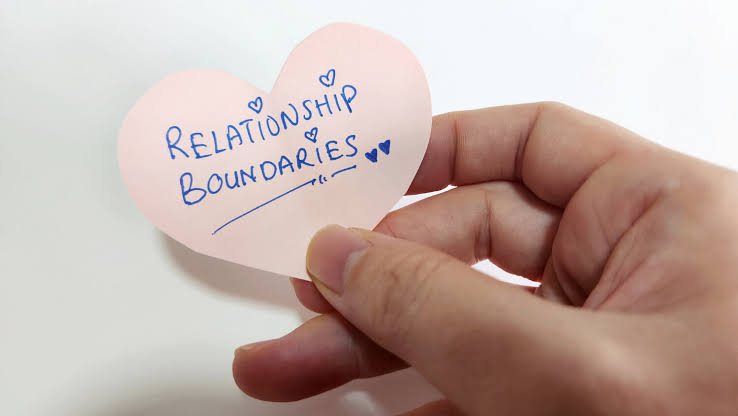
Let’s be honest: relationships can be beautiful, messy, fulfilling, and frustrating — often all at the same time. But one of the most crucial elements that determines whether a relationship thrives or crumbles is boundaries.
Yet, for many of us, “boundaries” feels like a scary word. It sounds like walls, distance, or even rejection. But in reality, healthy boundaries are not about keeping people out — they’re about letting the right kind of love, respect, and understanding in.
Whether you’re in a romantic relationship, friendship, marriage, or even a situationship, this guide will show you why boundaries matter, what healthy ones look like, and exactly how to set and maintain them — without guilt or drama.
What Are Healthy Boundaries in a Relationship?
Healthy boundaries are the emotional, physical, and psychological limits we set with others in order to feel safe, respected, and valued. They are the space where one person ends and another begins.
Think of a boundary as a fence with a gate — not a wall. It keeps the bad out, lets the good in, and allows you to decide who enters, when, and how.
In relationships, boundaries help define:
- What behavior is acceptable and unacceptable
- How much time and energy you can give
- What you’re comfortable with emotionally, physically, or mentally
- How you expect to be treated
They’re a sign of self-respect, and they also teach others how to love you in the way you deserve.
Read Also: Top most Common Sexual Fantasies and What to Do About Them
Why Healthy Boundaries Matter in Relationships
1. They Protect Your Well-Being
Without boundaries, we often give too much — time, love, money, patience — until we feel drained and resentful. Boundaries protect your mental health by making sure you’re not sacrificing your own needs to keep someone else happy.
2. They Foster Respect
When you stand firm on what’s important to you, others learn to value your time, emotions, and space. Relationships without boundaries often become unbalanced, with one person over-giving and the other over-receiving.
3. They Prevent Resentment
Lack of boundaries leads to silent frustration. You say “yes” when you mean “no,” give when you’re tired, or tolerate behavior that feels wrong — until it builds up and explodes. Boundaries stop that cycle.
4. They Encourage Healthy Communication
Clear boundaries invite honest conversations. You’re not expecting people to read your mind. You’re expressing what you need in a respectful way and creating space for mutual understanding.
5. They Strengthen Intimacy
Ironically, boundaries don’t create distance — they create safety. And when people feel safe, they open up more. In other words, boundaries deepen connection, rather than weaken it.
Signs Your Relationship Lacks Healthy Boundaries
If you’re wondering whether boundaries are an issue in your relationship, here are some red flags:
- You feel guilty saying “no” or speaking up
- Your partner makes decisions for you or ignores your opinions
- One of you is overly dependent on the other (emotionally or financially)
- You’re afraid to be yourself or express your true needs
- There’s frequent disrespect, passive-aggressiveness, or emotional manipulation
- You feel responsible for your partner’s happiness
The truth? Love without boundaries often turns into control, guilt, or emotional exhaustion.
Types of Boundaries in a Relationship
Let’s break boundaries down into a few important categories:
1. Emotional Boundaries
These protect your feelings and emotional energy. For example:
- “I’m not okay with being yelled at during arguments.”
- “I need time to cool off before discussing serious issues.”
2. Physical Boundaries
These define your comfort with physical closeness, touch, and personal space.
- “I don’t like public displays of affection.”
- “I need time alone to recharge after a busy day.”
3. Sexual Boundaries
These relate to consent, intimacy, and comfort in the sexual area.
- “I’m not comfortable trying that.”
- “I need emotional connection before being intimate.”
4. Time Boundaries
These help you manage how much time you give to others vs. yourself.
- “I can’t text all day while I’m at work.”
- “I need weekends to focus on my hobbies.”
5. Financial Boundaries
These set expectations around money and expenses.
- “Let’s have separate accounts and a joint budget.”
- “I’m not comfortable lending money to friends or family.”
Read Also: What Does It Mean to Be Sexually Repressed? And How To Handle It.
How to Set Healthy Boundaries in a Relationship
So how do you actually set boundaries — without feeling guilty or starting a fight?
1. Start With Self-Awareness
Before you set boundaries with someone else, you need to know what your limits are.
Ask yourself:
- What behaviors make me feel disrespected or uncomfortable?
- What drains me emotionally or physically?
- What do I need more of to feel secure in this relationship?
Journaling or therapy can help you get clarity here.
2. Communicate Your Boundaries Clearly
Be honest. Be kind. Be direct.
Use “I” statements like:
- “I feel overwhelmed when we argue late at night. I’d prefer we talk the next day when we’re calm.”
- “I need alone time every evening to decompress after work.”
Avoid blaming language like “You never respect me!” Instead, focus on your feelings and what you need.
3. Set Boundaries Early
Don’t wait until you’re fed up or hurt. The earlier you set boundaries, the easier it is to build a healthy dynamic. If you’re starting a new relationship, talk about expectations and values from the beginning.
4. Be Consistent
If you say “I won’t tolerate yelling” but then allow it repeatedly, your boundary loses power. People learn from your consistency. Reinforce your limits calmly, without getting defensive.
5. Be Ready for Pushback
Not everyone will respond positively when you set boundaries — especially if they benefited from you not having any. Some people might accuse you of being selfish, dramatic, or distant.
That’s okay.
Remind yourself: You’re not responsible for someone else’s discomfort with your growth.
6. Respect Their Boundaries Too
Boundaries go both ways. Ask your partner what they need and be willing to listen, even if it’s hard. Mutual respect and flexibility are key to a balanced relationship.
What Healthy Boundaries Look Like (With Examples)
| Boundary Type | Unhealthy Example | Healthy Boundary Example |
| Emotional | “I hide my feelings to keep the peace.” | “I express my needs even when it’s hard.” |
| Physical | “I let them touch me even when I’m uncomfortable.” | “I speak up when I need space or feel uneasy.” |
| Time | “I cancel my plans to be with them always.” | “I make time for both my partner and my own interests.” |
| Financial | “I give money to avoid arguments.” | “I discuss and agree on financial limits.” |
| Sexual | “I say yes even when I don’t feel like it.” | “I only engage in intimacy when I feel safe and ready.” |
Boundaries in Long-Term vs. New Relationships
In new relationships, setting boundaries early is easier because the dynamic isn’t fully formed yet. Think of it as laying the foundation for how you want to be treated.
In long-term relationships, boundaries may need to be renegotiated — especially after big changes like:
- Moving in together
- Having children
- Experiencing betrayal or burnout
It’s never too late to set boundaries. In fact, it can revive and reset even long-standing partnerships.
Can Boundaries Save a Toxic Relationship?
Boundaries can’t fix everything — especially if the other person consistently disrespects or violates them. In toxic or abusive relationships, setting boundaries may trigger more conflict or manipulation.
In these cases, boundaries might not be about saving the relationship, but about saving yourself. And that’s perfectly okay.
You may need to seek outside help, such as therapy or support groups, to navigate these decisions safely.
Final Thoughts: Boundaries Are Love in Action
Setting boundaries isn’t about being cold, distant, or selfish. It’s about being honest — with yourself and with others.
It’s about saying:
“I matter. My needs matter. And I deserve a relationship where love and respect go both ways.”
The truth is, boundaries are not barriers to love — they are pathways to healthier, deeper, and more meaningful connections.
So start today. Listen to your inner voice. Speak up. Be kind, but firm. You don’t have to apologize for having limits.
The people who truly care about you will not only respect your boundaries — they’ll thank you for showing them how to love you better.




